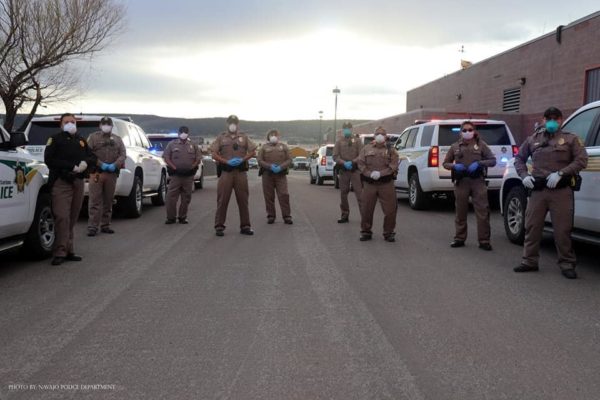
- Details
- By Native News Online Staff
Navajo Nation prepares for another 57-hour weekend lockdown
WINDOW ROCK, Ariz. – The Navajo Department of Health, in coordination with the Navajo Epidemiology Center, Navajo Area Indian Health Service, and the Tribal Health Organizations, reported 181 new cases of COVID-19 for the Navajo Nation on Thursday. The total number of positive COVID-19 cases for the Navajo Nation has reached 4,434, and the total number of deaths is now 147.
Preliminary reports from six health care facilities indicate that approximately 1,195 individuals have recovered from COVID-19, with more reports still pending. A total of 27,932 COVID-19 tests have been administered with 21,611 negative results. Approximately 13.2% percent of Navajo Nation residents have been tested for COVID-19.
“The increase in numbers is due to the large-scale testing events that have occurred on the Navajo Nation in recent days. The Navajo Nation health care facilities continue to test our citizens at a greater rate per capita than any state in the country. Over 13-percent of our residents have been tested compared to 10-percent for states. The Nation has implemented a contact tracing team to address the increased number of cases and to begin identifying the places and people the patient was in contact with to deter more cases. As the number of cases increased, the amount of work and planning increased as well, but together we can slow the spread and flatten the curve,” said Navajo Nation President Jonathan Nez.
On Thursday, the Nez-Lizer team distributed food, bottled water, cleaning products, and other essential supplies to 654 Navajo families in the communities of Halchita, Monument Valley/Oljato, Dennehotso, Tółikan, and Round Rock.
“As we approach another 57-hour weekend lockdown, we ask our Diné citizens to prepare ahead of time to avoid the rush into border towns and stores. If you need essential household items or need to finish errands, please plan. For example, get enough healthy food and water that could last for more than 14 days, and get your prescription medications in advance. Each household should have a safety plan to minimize exposure of the virus,” said Vice President Myron Lizer.
The weekend lockdown will begin on Friday at 8:00 p.m. until Monday at 5:00 a.m. The Navajo Nation’s stay-at-home order remains in effect requiring residents to remain home except for essential workers, cases of emergencies, and if there is a need to get food or other essential items.
For more information on reports, helpful prevention tips, and more resources, please visit the Navajo Department of Health’s COVID-19 website at http://www.ndoh.navajo-nsn.gov/COVID-19. To contact the Navajo Health Command Operations Center, please call (928) 871-7014.
_________________________________________________________________
To Donate to the Navajo Nation
The official webpage for donations to the Navajo Nation, which has further details on how to support the Nation’s Dikos Ntsaaígíí-19 (COVID-19) efforts is: http://www.nndoh.org/donate.html.
_________________________________________________________________
For More Information
For more information including reports, helpful prevention tips, and more resources, please visit the Navajo Department of Health’s COVID-19 website at http://www.ndoh.navajo-nsn.
For up to date information on impact the coronavirus pandemic is having in the United States and around the world go to: https://www.worldometers.info/coronavirus/country/us/?fbclid=IwAR1vxfcHfMBnmTFm6hBICQcdbV5aRnMimeP3hVYHdlxJtFWdKF80VV8iHgE
For up-to-date information about COVID-19, Native News Online encourages you to go to Indian Health Service’s COVID-19 webpage and review CDC’s COVID-19 webpage.
More Stories Like This
Native News Weekly (August 25, 2024): D.C. BriefsUS Presidents in Their Own Words Concerning American Indians
Native News Weekly (December 14, 2025): D.C. Briefs
Wounded Knee Massacre Site Protection Bill Passes Congress
Two Murdered on Colville Indian Reservation
Help us defend tribal sovereignty.
At Native News Online, our mission is rooted in telling the stories that strengthen sovereignty and uplift Indigenous voices — not just at year’s end, but every single day.
Because of your generosity last year, we were able to keep our reporters on the ground in tribal communities, at national gatherings and in the halls of Congress — covering the issues that matter most to Indian Country: sovereignty, culture, education, health and economic opportunity.
That support sustained us through a tough year in 2025. Now, as we look to the year ahead, we need your help right now to ensure warrior journalism remains strong — reporting that defends tribal sovereignty, amplifies Native truth, and holds power accountable.
 The stakes couldn't be higher. Your support keeps Native voices heard, Native stories told and Native sovereignty defended.
The stakes couldn't be higher. Your support keeps Native voices heard, Native stories told and Native sovereignty defended.
Stand with Warrior Journalism today.
Levi Rickert (Potawatomi), Editor & Publisher

